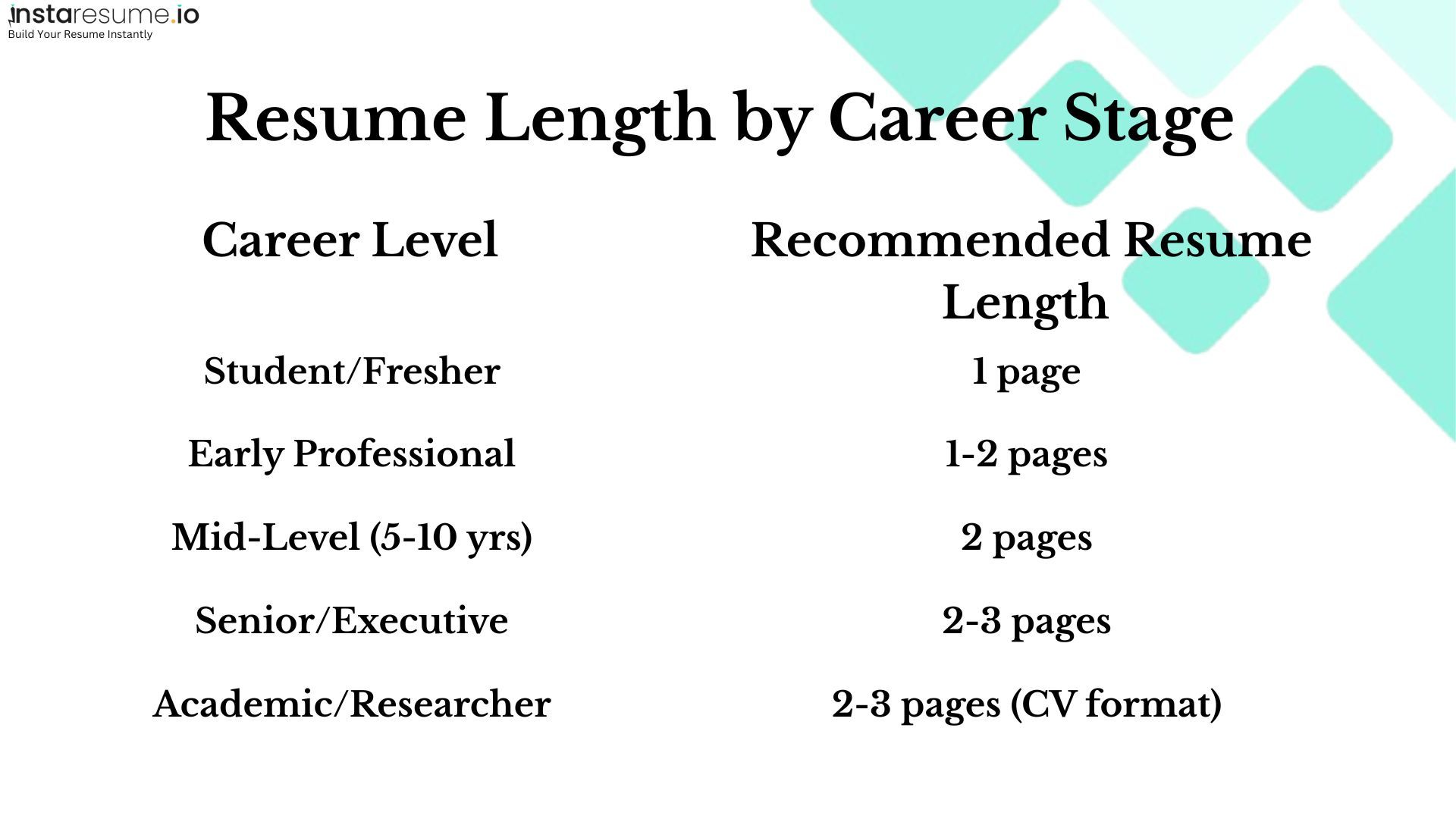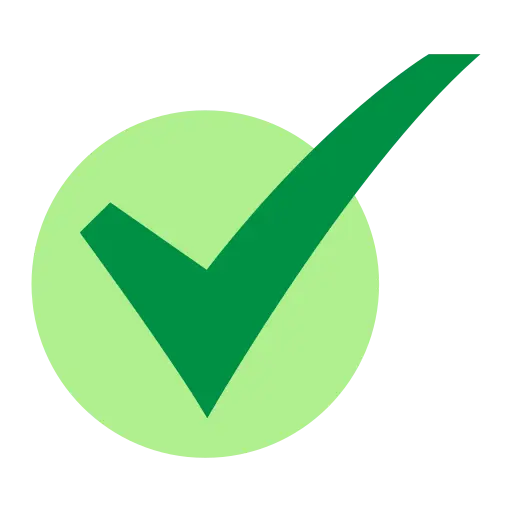Resume length by career stage
Trust Score: 4.8
362 reviews

Table of Contents
Resume length by career stage
Choosing the right resume length based on your career level can make or break your chances of standing out to recruiters. Whether you're fresh out of college or climbing the executive ladder, your resume should reflect the depth and relevance of your professional journey—without overloading it with unnecessary details.
1. Entry-level or student resume (0–1 Years of experience)
If you’re just starting out, such as a recent graduate or current student, a one-page resume for college students or freshers is usually ideal. At this stage, focus on your education, relevant coursework, internships, part-time jobs, and skills.
Recommended Resume Length: 1 page
Use when:
 You’re applying for internships or entry-level roles
You’re applying for internships or entry-level roles You have little to no professional experience
You have little to no professional experience You want to keep your resume concise and relevant
You want to keep your resume concise and relevant
Why it works:
Recruiters understand that students won’t have extensive work experience. Keeping your resume short and focused for students ensures they quickly find what matters—your potential.
Further Reading:
2. Early career professionals (1–3 Years of experience)
For those who have been in the workforce for a few years, a 1–2 page resume for professionals with limited experience is most effective. You now have some achievements, skills, and possibly certifications to showcase.
Recommended Resume Length: 1 to 1.5 pages
Use when:
 You’ve completed internships and have 1–2 job roles under your belt
You’ve completed internships and have 1–2 job roles under your belt You want to highlight early wins and performance metrics
You want to highlight early wins and performance metrics You’re transitioning industries or roles
You’re transitioning industries or roles
Why it works:
A bit more space lets you share real-world experience while staying relevant. This is a great stage to use a hybrid resume format to mix skills and accomplishments.
Further Reading:
3. Mid-level professionals (3–10 Years of experience)
If you’ve spent several years building your career, a 2-page resume for mid-level job seekers gives room to display career progression, skillsets, and leadership potential.
Recommended Resume Length: 2 pages
Use when:
 You’ve held multiple roles across companies or promotions
You’ve held multiple roles across companies or promotions You have project outcomes, KPIs, or certifications to show
You have project outcomes, KPIs, or certifications to show You’re applying for managerial or specialist roles
You’re applying for managerial or specialist roles
Why it works:
Employers at this level want to see how you've grown. A well-structured 2-page resume tailored to mid-career professionals provides space without overwhelming.
Further Reading:
4. Senior-level or executive Resume (10+ Years of experience)
For executives, directors, or seasoned professionals, a 2–3 page resume for senior executives may be necessary. You’re expected to detail strategic contributions, leadership roles, and measurable impacts.
Recommended Resume Length: 2–3 pages
Use when:
 You’ve held high-level roles in multiple organizations
You’ve held high-level roles in multiple organizations You’ve managed large teams, budgets, or departments
You’ve managed large teams, budgets, or departments You’re applying for C-suite, VP, or Director positions
You’re applying for C-suite, VP, or Director positions
Why it works:
Your resume should reflect the complexity of your career. However, keep it concise—focus on outcomes, not job descriptions. Executive resume formats often include a summary of qualifications and selected accomplishments.
Further Reading:
FAQs on Resume Length by Career Stage
Q1. How long should a resume be for a fresher or student?
For students, fresh graduates, or entry-level applicants, a one-page resume is ideal. At this stage, recruiters expect a concise summary highlighting education, academic achievements, internships, volunteer work, and relevant projects. Avoid unnecessary sections like lengthy job descriptions or unrelated hobbies — instead, focus on skills and potential.
Q2. Is a two-page resume acceptable for professionals?
Absolutely. If you have 5–10 years of professional experience, a two-page resume allows you to include career highlights, measurable results, and leadership roles without making the layout cluttered. The key is relevance — every line should add value. Use clear headings and bullet points to improve readability.
Q3. What is the ideal resume length for executives or senior managers?
For senior professionals, directors, or executives with over a decade of experience, a two to three-page resume is acceptable. Employers at this level expect depth and evidence of impact. Highlight strategic roles, accomplishments, team management, and decision-making outcomes. Keep formatting clean and avoid overloading with early-career details.
Q4. Do recruiters prefer one-page resumes?
Recruiters don’t follow a strict rule on page length — they prioritize clarity, structure, and relevance. A one-page resume works perfectly for early-career candidates, but for experienced professionals, a well-organized two-page resume that demonstrates achievements and growth is more impressive than a cramped single page.
Q5. How does career stage affect resume length?
Your career stage directly shapes your resume’s scope.
 Students or recent graduates: Focus on academics, internships, and potential (1 page).
Students or recent graduates: Focus on academics, internships, and potential (1 page). Mid-career professionals: Showcase accomplishments, results, and growth (1–2 pages).
Mid-career professionals: Showcase accomplishments, results, and growth (1–2 pages). Executives: Emphasize leadership, strategy, and influence (2–3 pages).
Executives: Emphasize leadership, strategy, and influence (2–3 pages).
Each stage demands a balance between brevity and impact.
Q6. Will a longer resume reduce my chances of getting hired?
No — length alone doesn’t determine rejection. What matters is content relevance and readability. A two-page resume that’s well-organized and results-driven performs better than a one-page resume filled with fluff. Always tailor your resume to the job description and use keywords that match the role.
Q7. Should a resume include all past jobs?
Not necessarily. Include only relevant roles from the last 10–15 years that align with your target position. Early or unrelated jobs can be summarized or omitted. This keeps your resume concise and focused, ensuring the hiring manager quickly identifies your most valuable experience.






